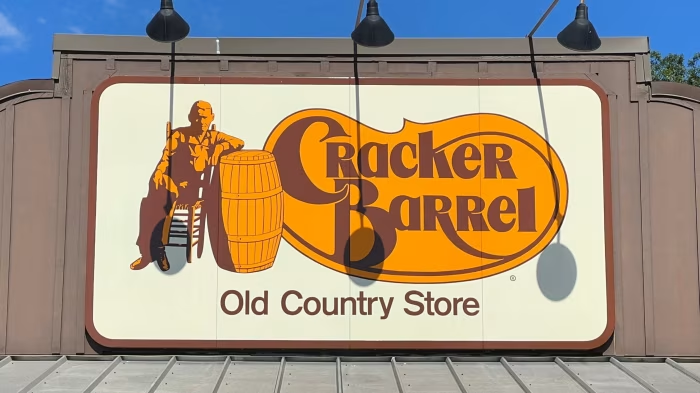Share this @internewscast.com
An old-fashioned restaurant known for serving country-fried steak and chicken n’ dumplins on the side of America’s highways has become the latest flash point in the country’s political divide — and a fresh opportunity for the US president to assert his power over corporate America.
Cracker Barrel, a restaurant chain founded in Tennessee in 1969, is known for Southern-style comfort food, a knick-knack market and rocking chairs out front. In 2004 the justice department accused it of racial segregation and discrimination in its restaurants, claims the group denied.
In recent months brands that are little known outside the US have experienced a fierce backlash over rebrands or adverts, with Donald Trump and his allies often weighing in, amplifying social media uproar that has roiled share prices and drawn in Hollywood stars.
Cracker Barrel ignited a firestorm when it simplified its logo on August 19, ditching “Old Timer”, an elderly man leaning against a barrel who has long been part of its lore, in favour of a streamlined design.
Cracker Barrel’s new logo sparks controversy
Old

new

The logo tweak brought a debate that had simmered in recent years over a move to offer a more inclusive culture — including an effort focused on supporting the LGBTQ+ community — to the fore.
Actor James Woods told 4.9mn followers on X last week that Cracker Barrel’s LGBTQ+ efforts were a “cancer rotting the soul of a cherished restaurant”. Rightwing activist Christopher Rufo vowed he would “break the Barrel” to thwart any risk of “wokification”. Florida Congressman Byron Donalds wrote that he gave his life “to Christ in their parking lot”.
Donald Trump Jr simply posted: “WTF is wrong with Cracker Barrel??!”.
The backlash reflects a divided America and a deeply-fractured media ecosystem that the US president has leaned into. After weeks of anger and Fox News segments about the rebrand, President Trump on Tuesday urged Cracker Barrel to reverse course.
Within hours Cracker Barrel — which is valued at $1.4bn on the stock market — complied, stating “we said we would listen, and we have”. Its stock rose 8 per cent.
Brian Wieser, an advertising consultant and former WPP executive, compared the current moment to “1970s Quebec or Ireland during the Troubles”, when brands studiously avoided political controversy.
In both of those cases, “basically every brand stayed away from it, absolutely did not want to touch it. It was: ‘whatever you say, say nothing’”.


However social media has drastically changed the media landscape, allowing ordinary people to hijack brand messaging, he said.
“Marketers back then had complete control over their brands . . . but in this era, due to social media, individuals can commandeer the brand. This scenario can happen where your brand can be potentially destroyed.”
The Cracker Barrel saga follows a controversy earlier this year around teen retailer American Eagle after it ran an advertisement with Hollywood actor Sydney Sweeney touting her “good jeans”.
Some liberal voices criticised the ad for glorifying blonde-haired, blue-eyed ideals. Conservatives then attacked the left for “wokeism”, escalating the issue for weeks via Fox News, with President Trump weighing in to say American Eagle “has the ‘HOTTEST’ ad out there.”
In another similar incident, Anheuser-Busch InBev in 2023 suffered a steep drop in sales of Bud Light after it collaborated with a transgender influencer, triggering a furious reaction from some conservatives.
“The takeaway for the companies is that there are a group of people: customers, regulators, the whole gamut on both the right and left that increasingly see things in political terms,” said Jill Fisch, a professor at the University of Pennsylvania’s Wharton School. “I don’t think we’ve seen an environment that’s as politically charged before [in the US].”

In Cracker Barrel’s case, the logo change was part of a years-long effort to turn around the company’s fortunes.
Chief executive Julie Masino, who was appointed in 2023, has been pushing to modernise the company as its sales have struggled in recent years, forcing the group to close hundreds of locations. “We’re just not as relevant as we once were,” Masino said last year.
In recent years the company has backed Pride celebrations and revamped its restaurants, replacing ornate colonial furniture with brighter lighting and more modern interiors. People who did not appear politically motivated were upset by the overhaul of the restaurants, posting on social media in recent months that the new look was bland.
As recently as last week, Masino had gone on Good Morning America stating that the logo change was “working”. “The feedback’s been overwhelmingly positive that people like what we’re doing,” she said. “The buzz is so good.”
But the abrupt reversal underscores the tightrope US companies now walk in a hyper-partisan America.
Fox News host Jesse Watters captured the sentiment on Tuesday: “You just have to keep your audience happy with what they’re used to,” he told viewers. “That’s why people will be watching Fox until they die.”












